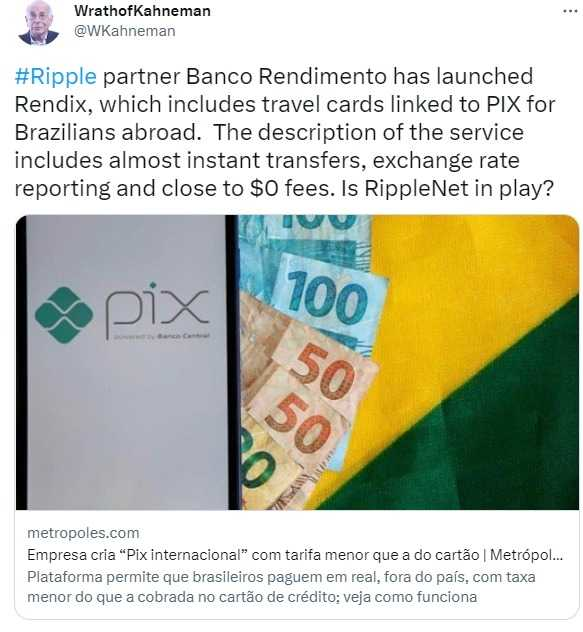((Dinarian Note: Ripples ODL Being Used Behind The Scenes From anything to anything for a fraction of a penny.. XRP)

Launched in November 2020 by Banco Central (BC) and quickly popularized throughout Brazil, Pix started to win the world. In November 2022, exactly two years after the emergence of the instant payment and financial transfer system, Agillitas , Banco Rendimento ’s payment institution , launched Rendix, which works as a kind of “international Pix”.
The new platform, authorized by BC, made life easier for Brazilians who go abroad and, until then, were unable to make purchases through Pix outside the country. Now, all you have to do is find a store or commercial establishment that has joined Rendix to make the payment instantly, as in Brazil.
With the new system, shopkeepers issue a QR Code, through which the consumer makes the payment. One of the biggest advantages of the platform is that, instead of the 6.38% Tax on Financial Operations (IOF) on credit card purchases in foreign currency, the rate charged is only 0.38% per transfer.
Another source of relief for customers is that, unlike the exchange rates charged by cards on the day the invoice is closed, Rendix processes the exchange rate at the time of purchase. The consumer is informed at the time, with an electronic message, about the fee he is paying for that international transaction.
“The advantage for the shopkeeper is that he doesn't have any discount fees associated with this operation, he doesn't have the machine fees that we see around here. So, he is interested in offering the means of payment to the customer. Another advantage is that the shopkeeper is not tied to the limit of the consumer's card”, says the CEO of Agillitas, Henrique Capdeville, in an interview with Metrópoles .
“The consumer types in his CPF, we take this CPF from the holder and carry out some regulatory validations that are important”, explains Capdeville. “When paying, the customer opens their bank application. It can be any Brazilian bank that operates Pix. He reads the QR Code, makes the transfer and this transaction, at first, takes place in reais. This customer sends the money to Agillitas and we carry out an exchange operation whose beneficiary is the shopkeeper abroad.”
Rendix was created as an eFX (Electronic Foreign Exchange) service platform. The category encompasses payment services or international transfers operated digitally and duly regulated by BC.
“We provide the seller with a web platform, which does not require any type of integration on the merchant's side. There is no payment arrangement out there, we are not Visa or Mastercard. It's just a way for our customers to accept payment in cash in another currency, which is the real”, details Capdeville.
So far, according to Agillitas, around 30 commercial establishments abroad use Rendix, the majority located in Latin America. The model has been increasingly used, mainly in cities where there is a strong presence of Brazilian tourists, such as Buenos Aires and Bariloche (Argentina), Punta Del Este (Uruguay) and Ciudad Del Este (Paraguay).
There are also stores and commercial departments that already use Rendix in France, Portugal and the United States. Even in Qatar, at the end of last year, it was possible to buy products and tickets for some games and events related to the World Cup through Pix.
“Those who travel frequently to other countries know that quotations in real are not so easily found. It is always necessary to convert to a currency such as the dollar or euro to carry out transactions, even at exchange offices. With this product, we were able to expand the real as a currency for international use”, says the CEO of Agillitas.
Central Bank studies changes to PixIgo Estrela/Metrópoles

In early November 2020, financial institutions began releasing Pix pre-registration for customers, within official bank appsHugo Barreto/Metropolises
BC wants to launch international Pix by 2025
Agillitas' initiative, in a way, is a preview of BC's own plans, which has among its projects the internationalization of Pix. According to BC’s Department of Competition and Financial Market Structure, the implementation of the “official” international Pix should take place in 2025.
According to the monetary authority, the product will begin to be developed as early as 2023, which involves everything from design to testing. The goal is to start production in the second half of 2024, still on an experimental basis, so that the launch takes place in the first half of 2025.
According to BC, the international Pix should take a few years to become a reality because it involves complex integrations between different systems and depends on the pace of implementation in each country – which is not under the control of the Brazilian monetary authority.
“Connecting domestic instant payment systems is certainly a possible path towards this end. However, there is still a lot of work to be done to harmonize regulations, technology and operations in different payment systems”, says the director of Organization of the Financial System and Resolution of the BC, Renato Gomes.
For Capdeville, from Agillitas, the emergence of the “official” international Pix will not harm Rendix. On the contrary: the platform has everything to grow even more.
“This will strengthen our business. Today, the difficulty is finding a local partner that can do the last mile of the sale. I take my client's real, convert it into dollars and find a local bank that has access to the local settlement to make the last payment line”, he explains. “When the BC creates the international Pix, it will allow Brazilian banks to enter this international settlement trail, so that there is no need to look for a partner abroad. It will only make our job easier.”
Pix around the world
In view of Pix's success in Brazil, other countries have been looking into new transfer systems and instant payments, in formats similar to the Brazilian model.
The Bank for International Settlements ( BIS ), considered “the Central Bank of Central Banks”, has been testing the Nexus platform, which will allow instant financial transfers to around 60 countries.
Euro zone countries, with the intermediation of the European Central Bank (ECB) and the BIS, in addition to Malaysia and Singapore, are already testing the Nexus. Brazil participates in the tests and development of the platform as a consultant. In the United States, the FedNow system should be launched in the first half of this year and promises to end the use of checks in the country. There are similar initiatives in China, India and Australia.
In 2022, Pix moved R$ 10.9 trillion, according to BC data. The amount corresponds to more than twice the amount recorded in 2021 (R$ 5.21 trillion). The total moved by Pix last year exceeds by more than twice the amount of payments for boletos (R$ 5,3 trillion).
In number of transactions, Pix appears in the lead with ease: 24.3 billion in 2022 alone, compared to 4.03 billion payments by boletos and 1.01 billion TEDs. In December alone, Pix users performed 2.9 billion operations. Last month, Pix had 141.6 million registered users and 550.8 million registered keys (CPFs/CNPJs, emails, mobile phone and random sequences).











 All while Pfizer—a company with a $2.3 billion criminal fine for fraudulent marketing, bribery, and kickbacks—was given blanket immunity from liability and billions in taxpayer dollars to produce a vaccine in record time with no long-term safety data.
All while Pfizer—a company with a $2.3 billion criminal fine for fraudulent marketing, bribery, and kickbacks—was given blanket immunity from liability and billions in taxpayer dollars to produce a vaccine in record time with no long-term safety data.
























